You can tell by the title of the article that cortisol blockers may actually not be as effective as you would hope…
We all know that excess cortisol can lead to weight gain so the idea of “blocking” cortisol may sound enticing as a potential weight loss treatment.
But does it actually work?
Well, not necessarily, at least not how you might imagine.
This article is for you if you want to learn why excess cortisol leads to weight gain, how to manage your stress and cortisol and how to use certain supplements to help block the effects of cortisol on the body…
Cortisol is Essential to Life but How much is Too Much?
So what is cortisol?
Cortisol is a hormone that is generally secreted when your body is under stress from 2 hormonal glands known as the adrenal glands which sit on top of your kidneys.
This powerful hormone activates cellular mechanisms which help the body tolerate or manage the stress that you are putting it under.
And some stress is perfectly fine, but when you start to tip the balance in favor of excess stress then you start getting into trouble.
But back to the basics for a minute:
When your body is under stress (and stress can mean exercise, not eating enough, having trouble with your spouse, getting stuck in traffic, etc.) it secretes this hormone to “help” your body handle the stress.
And this is a good thing:
Cortisol helps your body liberate or free up excess glucose or sugar for immediate use by your muscles (1), it helps promote adrenaline use and it revs up your entire system and gets you ready for “action”.
But this can be a double-edged sword.
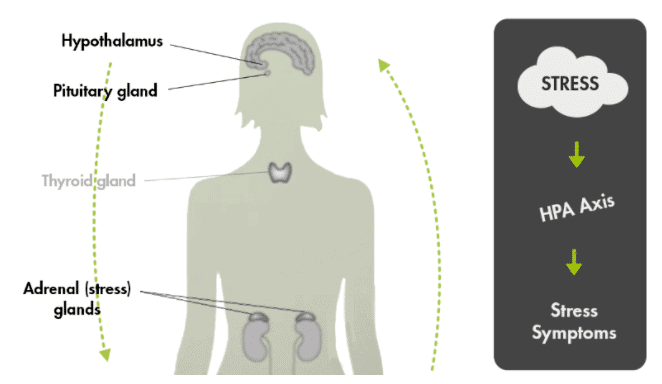
High blood sugar is great if you are under stress because it provides your body with instant energy and mental focus – both of which are required if let’s say you need to finish a paper or a project at work.
But what if that stress is constant, never dies down and there is no end in sight?
That kind of stress can negatively impact blood sugar regulation (2) in your body and may lead to a condition known as insulin resistance.
You probably know that high blood sugar may result in the condition of type II diabetes mellitus.
You probably also know excess blood sugar can lead to weight gain and obesity.
And this is potentially a big problem – especially if your goal is weight loss.
Excess cortisol secretion, from extremely stressful situations, can therefore potentially cause an increase in serum blood sugar and ultimately lead to weight gain (3).
This sounds good in theory but the picture isn’t that clear.
You would think that stress might cause a total increase in serum cortisol level, but studies don’t necessarily confirm this response by the body.
Short-term studies do show that serum cortisol levels spike (4) after a very stressful situation such as acute lack of sleep, but then they tend to go back to normal after the stimulus is removed.
You would also think that people who are under constant stress would show either high or low cortisol levels but this isn’t necessarily true either.
What we see instead is a change in the receptor sensitivity to cortisol in the body (5).
So what may be happening in some individuals (and this may explain why many doctors don’t recognize cortisol issues as a problem), is that they develop a cortisol cellular resistance which can be difficult to identify with standard blood tests.
The main problem here is that you may present with all of the symptoms of excess cortisol but still maintain relatively “normal” serum cortisol levels!
We’ll discuss how to handle this situation but for now, let’s talk about impacting your weight by managing cortisol:
Does Blocking Cortisol Help with Weight Loss?
When we talk about cortisol blockers it’s important to exactly define what we mean by the word “cortisol blocker”.
Certain supplements are marketed in such a way as to make you believe that they actually block the release of cortisol – these are NOT the kind of supplements you want to take.
You would never want to completely “block” the release of cortisol from your body.
The complete blocking of cortisol may lead to serious life-threatening conditions such as an Addisonian crisis (6).
Another set of supplements (the good kind of cortisol supplements) would be better defined as supplements that modulate your response to stress.
I call these types of supplements “cortisol enhancing” supplements, which may be a better name than “cortisol blockers” and these types of supplements actually work.

These supplements help your body naturally cope with stress and naturally influence hormone and cortisol function (7).
These supplements have been shown to influence what is known as your “resilience” to stress and may influence serum cortisol in the process (8).
And this is exactly what you want to have happened:
Instead of blocking the release of cortisol from your body doesn’t it make more sense to help your body respond to the stressful stimulus?
It’s a safer and more natural approach.
Not surprisingly these supplements have also been shown to help increase muscle mass (9), improve mood and help with other problems associated with excess stress (10).
They are NOT a magic weight loss pill, however, and you shouldn’t consider them as such.
No matter how badly you want to believe that your weight problem can be solved with a simple supplement it’s almost never true.
Cortisol enhancers can absolutely HELP with weight loss but they should ALWAYS be combined with other treatments and therapies (more on that below).
Checking your Cortisol Levels
First, it’s worth discussing how to test for cortisol issues in the body.
Remember when I mentioned that some people don’t have issues with their total cortisol level and instead have issues with cellular resistance?
Well, that problem makes testing for cortisol quite difficult and is one of the reasons that there are so many cortisol tests available.
You can test cortisol through saliva (11), urine, and blood.
Which begs the question: is one test better than the other?
I’ve outlined what I consider to be the “best cortisol test” in another post but for the purpose of weight loss there turns out to be a different and better way to approach cortisol:
Instead of focusing on the more expensive and time-consuming salivary and urinary tests, you can always start with the cheaper and fairly effective serum cortisol test.
To do this test you simply need to wake up at 8 am in the morning (when cortisol should be at its highest) and get your blood drawn.
From there you can look at your results and determine if there is a problem.
When evaluating serum cortisol you want to look for “optimal ranges” instead of the traditional and conventional reference range provided by the labs.
See the optimal ranges below:
- Sub-optimal “low” cortisol range: serum cortisol levels < 10 ug/dL
- Optimal serum cortisol range: serum cortisol between 14-16 ug/dL
- Sub-optimal “high” cortisol range: serum cortisol levels > 20 ug/dL
You can see an example of sub-optimal levels below:

Remember these ranges are what is considered to be “optimal” and they may not be flagged by the laboratory as abnormal.
This has to do with the incredibly large “normal” range provided by most labs which extend from 4 to 26 or so ug/dL.
Another tactic for evaluating cortisol is to look at the distribution of body fat on your body.
Studies have shown that women under stress tend to gain weight in certain areas on their bodies, predominately the belly, and the hips/thighs (12).
So even if your “cortisol” remains somewhat normal in the bloodstream you can also identify abnormalities based on how fat is stored and placed on your body.
So once you’ve identified that you have a problem what next?
Treatment!
How to Actually Influence Cortisol for Weight Loss
Instead of going to your local GNC store or searching for “cortisol blockers” on Amazon, you will have much better luck by looking for supplements that contain ingredients known as adrenal adaptogens or adrenal glandulars.
These supplements have scientific studies (13) (hundreds actually) showing that they are not only effective but that they are safe to use as well (provided you use them correctly).
But as always, you’ll get the best results if you use a combination of weight loss therapies.
What do I mean?
Combining supplements with lifestyle activities will help more than just taking one supplement and calling it a day.
Consider this example:
Let’s say that you have elevated cortisol from the combination of stress at work and from sleeping only 5-6 hours each night.
You’ve noticed that you have slowly gained 5-10 pounds over the last 6 months or so and you believe that it’s from cortisol.
You check your cortisol and find that it’s elevated to around 20 ng/dL or so, you then conclude that you should take something to ‘fix’ your cortisol.
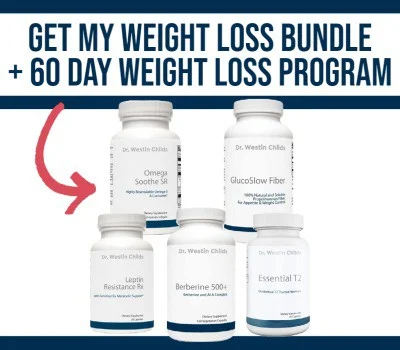
Would taking a supplement actually help you with weight loss in this case?
Probably NOT unless it’s also accompanied by strategies designed to help reduce your stress and IMPROVE your sleep.
Why?
Because all of these conditions are contributing to cortisol dysregulation in your body.
So whenever you consider the use of cortisol supplements make sure you are also taking care of the obvious problems such as stress, sleep, and your diet.
Having said that supplements absolutely DO have a place in treatment but you need to make sure you are using the right ones:
Adrenal Glandulars Balance Cortisol & Increase Energy
Directly help to increase energy, and concentration and treat adrenal fatigue.
Can be combined with adrenal adaptogens for increased benefit.
May also help with other conditions such as hypothyroidism or thyroid disease.
Help provide your body with nutrients to improve cortisol and adrenal function.
One of the best and most effective ways to balance cortisol is by using adrenal glandulars.
If you haven’t heard of adrenal glandular supplements then you aren’t alone.
In a nutshell, these supplements are made by taking the adrenal gland of certain animals (usually bovine) and crushing it up into tiny particles which are then consumed by patients.
It may sound disgusting but they work quite well for many people.
But why do they work?
Well, we know that cortisol is an important part of adrenal function but you’d be crazy to think that cortisol is the ONLY important hormone or enzyme secreted by your adrenal glands.
It’s possible that this ground-up adrenal gland may contain enzymes and other trace amounts of hormones that naturally provide your body with hormone precursors which help the adrenal glands function.
It’s also felt that the use of these supplements may “lift” or “lighten” the burden placed on your adrenal glands from stress and give your body a break and time to recover.
The exact mechanism is not well understood but many patients agree that they work well.
My personal experience (both on myself and on patients) suggests that most people (around 70-80%) benefit from adrenal glandular use to manage cortisol and stress.
Adrenal glandulars can also safely be combined with adrenal adaptogens which we will discuss below.
How to use: Take up to 2 capsules of adrenal glandulars each day and combine them with adaptogens or high doses of Vitamin B6. Be prepared to use this supplement for 3-6 months (depending on the severity of your symptoms).
Ashwagandha (and Adrenal Adaptogens) Increase Stress Resilience and Balance Serum Cortisol
May help promote weight loss more than other adaptogens.
Helps improve sleep, reduce anxiety and increase cognition.
Improves resilience to stress and increases exercise performance.
Often combined with adrenal glandulars for improved results.
Adrenal adaptogens have also been shown to help influence cortisol levels in many clinical studies.
The adaptogen ashwagandha has long been used in traditional medicine to treat the condition we now recognize as “burnout syndrome”.
There are many different types of adaptogens ranging from Rhodiola (also found in my recommended adrenal glandular product), holy basil (14), ginseng (15), and eleuthero and while they all influence cortisol they also work in slightly different ways.
When it comes to balancing cortisol and managing weight I think that ashwagandha is probably the most powerful in this arena.
Ashwagandha has been shown to improve the quality of your sleep (16), help increases your tolerance to stress, improve your ability to exercise (17), reduce inflammation and promote libido.
Another very important benefit is that ashwagandha also appears to have thyroid-boosting properties which are very important for those interested in weight loss.
Your thyroid helps control your basal metabolic rate and resting energy expenditure which means that it’s critical for determining how many calories you burn throughout the day.
Ashwagandha is great for people who suffer from excess weight gain secondary to high cortisol levels but also have issues with trouble sleeping, fatigue, and increase anxiety.
It appears to have a calming effect and is particularly helpful for those with anxiety or people who suffer from a “racing mind”.
Using ashwagandha is also quite simple:
It can be combined with adrenal glandulars, used by itself, or combined with other adrenal adaptogens such as holy basil or Rhodiola.
I also find that those with thyroid issues do particularly well on this herb.
How to use: Start with 500-1000mg per day and use for 3 to 6 months. It takes a while to treat cortisol issues so be prepared for the long haul.
Manage your Stress More Effectively
When looking into weight loss you have to be cognizant that in most cases weight gain is not caused by any one single thing.
Instead weight gain is usually secondary to multiple issues that all compound on one another to create hormone imbalances that lead to weight gain.
This is especially true in the case of cortisol.
Highly stressful situations, over-exercising, not sleeping enough, relying upon caffeine and refined sugars for energy sources, and problems with siblings/parents/loved ones may all be contributing to your weight.
The solution is not a simple over-the-counter supplement but instead a plan of attack that includes managing these stressors, changing your diet, AND taking the right supplements for your body.
The good news is that you can impact your weight, the bad news is that it may take some work!
But nothing good is never always that easy.
But now I want to hear from you:
Are you dealing with cortisol issues?
Have you taken any of the cortisol-blocking supplements listed above?
Did they work for you?
Why or why not?
Leave your questions or comments below!
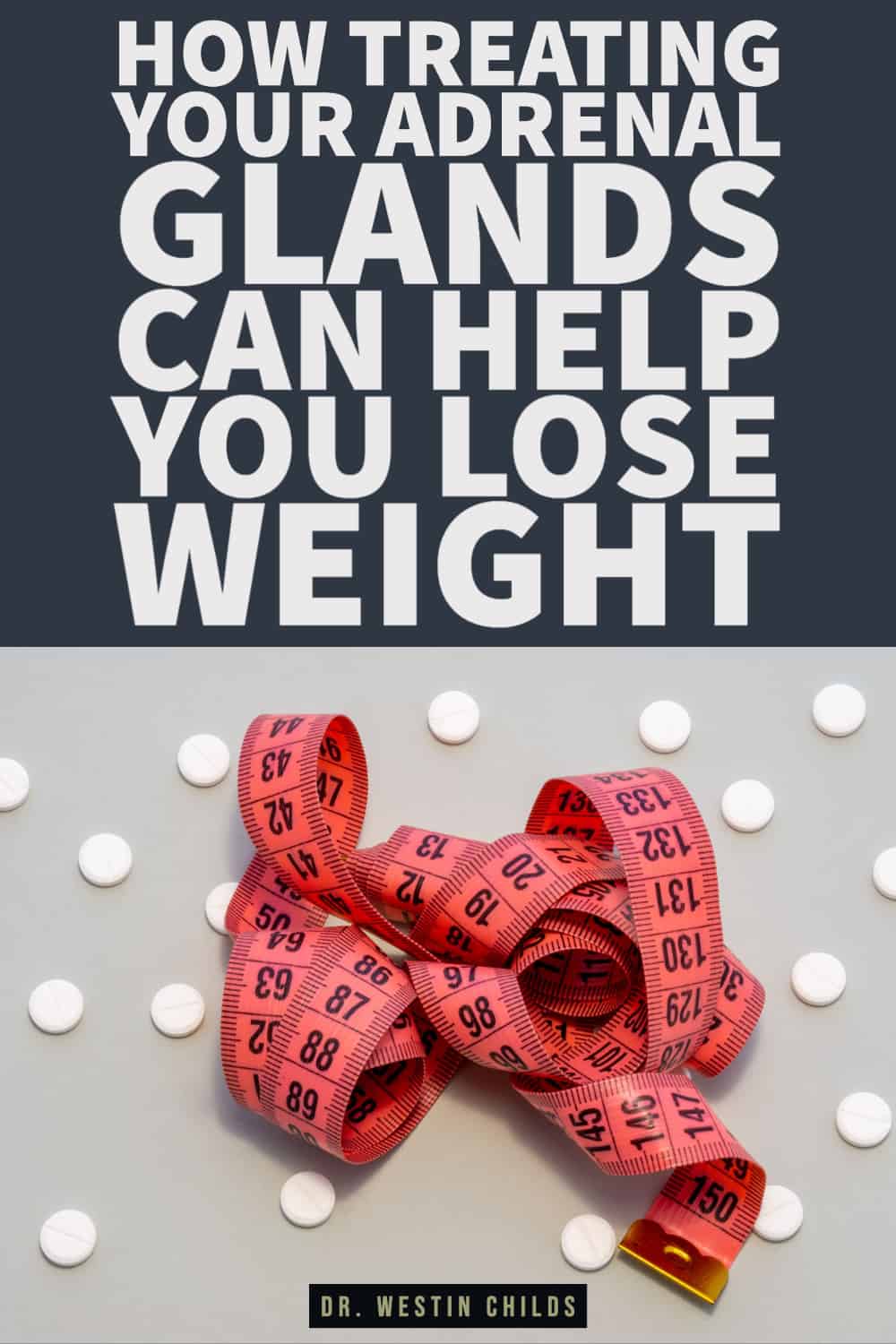
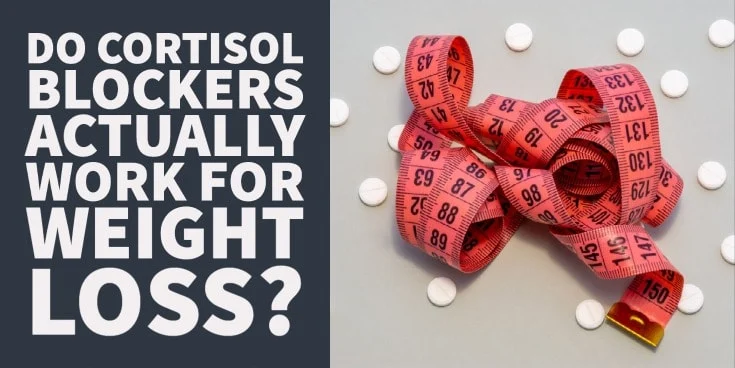



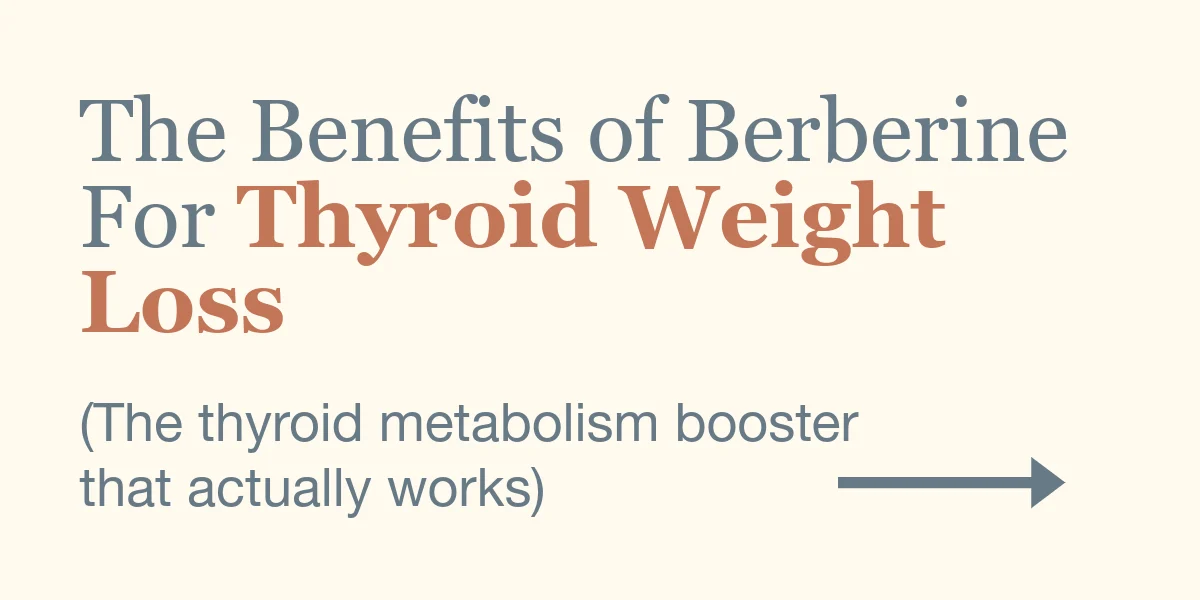



Most of my thyroid was removed 2009 and i havent been well since. I gained 6 stone in weight, having been super fit until that point, i now find exercise impossible i just dont have the strength or energy. 18 months ago i was switched to t3 only and have lost some weight but i still suffer with bone crushing fatigue and pain in my hips, knees, ankles and burning feet. I have lipodema which is painful in my legs. My cortisol was recently checked by 4 point saliva (very low, very low, low, high at night) blood cortisol 95 (9am 150-550 so very low again) a week later my blood cortisol 195. Any activity floors me for days. i have tried holy basil at night to lower night cortisol and hydro cortisone 10mg early morning and tbh i felt worse. I have tried the CT3M process and it hasnt helped, so i would be interested in ideas. My Vit D B’s & B12 are all optimal, i supplement iron.I find going to sleep and staying asleep difficult at night but could sleep all day, i would be glad of any input.
Hi Nicky,
It’s not uncommon for patients to feel very poorly post thyroidectomy and it may be secondary to insufficient medication/wrong ratio of T4/T3, etc.
You can read more about those concepts here: https://www.restartmed.com/weight-loss-thyroidectomy/
You may be able to increase your energy with supplements but they won’t be able to take the place of medications.
Hmm. Two questions …Can a high cortisol be a reason for irregular periods? As I understand it a high cortisol also leads to insulin resistance which can get hormones out of balance. With An untreated high cortisol, your insulin resistance does not really improve?
Thank you so much for sharing your knowledge. I am emailing you on behalf of my mom. She had 95% thyroidectomy nearly 2 years ago but is still have trouble with finding the right dosing for her. She is was just switched and is now taking 62.5 mcg Synthroid (was taking 50 mcg)to and 5 mcg Cytomel in a.m. and 2.5 mcg in afternoon(wasn’t changed). Her labs on the 50 mcg came back as follows: TSH 5.5, ft3 2.3 pg/nl (2-4.4) and rt3 5.2 ng/dL (range 9.2-24.1). She is not sleeping well, hair is falling out again, agitated, nonstop crying, having troubles concentrating and sweating again. Mom has been on the 62.5 mcg for 12 days now and these symptoms returned about 4 days ago. I am concerned about the rt3. What could be the reason for a low rt3 with a TSH of 5.5?